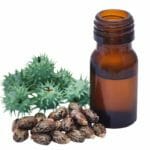Micellar Water vs Cleansing Oil: Pros and Cons
At BeautyCaters, our expert team independently curates every recommended product. Purchases through our links may earn us a commission. Explore our transparent selection process.
Micellar water vs cleansing oil: How you cleanse your skin matters. If you overdo it, you’ll ruin it, leaving your face dry, sensitive, and even oilier, as your skin begins to produce too much oil to compensate.
But on the other hand, if you don’t cleanse your skin thoroughly, you risk seeing impurities accumulating in your pores, which cause acne, for example.
Contrary to what one might think, the choice of a make-up remover is not to be taken lightly. While each formula has pros and cons based on your skin type, it’s also important to know which ingredients to avoid.
We have discussed Toner vs Micellar water in the past, today we will discuss Cleansing Oil vs Micellar Water, and their pros and cons.
Key Takeaways:
The key to achieving the perfect balance is not how often you should wash your face, but what type of cleanser to use. There are always big debates when it comes to choosing the right formula to cleanse your face. With the endless parade of new products, it can be hard to decipher what really suits you best. Two of the most innovative formulas also sit opposite each other, micellar water and cleansing oil, which only adds to the confusion. Let’s see this together!
- Micellar Water vs Cleansing Oil at a Glance
- Best makeup remover for dry skin: Natural cleansing oil
- Micellar water: ideal for oily skin
- Suitable makeup remover for balanced (normal) skin
- Criteria to choose your make-up remover
- How to favor certain ingredients for makeup remover
- What ingredients to avoid in makeup remover
- Final Verdict: Oil cleanser vs Micellar water
- Faqs: Cleansing oil vs Micellar water

Micellar Water vs Cleansing Oil at a Glance
Cleansing oil vs Micellar water at a glance:
| Category | Micellar Water | Cleansing Oil |
| Skin Type | Suitable for all skin types, but more suitable for combination to oily skin | Suitable for dry, sensitive, reactive, and oily-prone skin |
| Effectiveness | Not very effective against waterproof makeup | Very effective in removing all types of makeup, including waterproof makeup |
| Residue | Does not leave a greasy residue on the skin | May leave a greasy film on the skin if not removed properly |
| Comedogenicity | Does not clog pores | Should be based on non-comedogenic vegetable oils, such as sweet almond, hazelnut or jojoba oil, to avoid pore congestion |
| Skin Hydration | Does not strip the skin of its natural oils and leaves the skin hydrated | Nourishing ingredients such as vitamin E, vitamin A, retinol, avocado, jojoba, rosehip and essential fatty acids can help to restore the skin’s lipid barrier and moisturize the skin |
| Convenience | Does not require rinsing after use | Requires water to remove the oil properly |
| Allergies | Its natural composition reduces the risk of allergic reactions and other side effects | May cause a reaction in dry, sensitive and reactive skin, where this type of makeup remover should be avoided |

Best makeup remover for dry skin: Natural cleansing oil
If you have dry skin, it is important to use a suitable makeup remover to avoid drying it out further.
Indeed, you must replace the lost skin lipids with an oil-based product to regain the integrity of the skin.
The drier the skin, the more oily the product you should use. I advise you to choose cleansing oil containing nourishing ingredients such as vitamin E, vitamin A, retinol, avocado, jojoba, rosehip and essential fatty acids.
A good oil-based cleanser will leave skin feeling clean, light, and hydrated, without feeling tight or dry. Having dry and sensitive skin, the skin benefits of opting for a natural makeup remover allow me to cleanse it while moisturizing it properly.
With makeup remover oil, it is easier to remove residue with just a few swipes, including mascara and long-lasting lipstick.
On the other hand, micellar water requires much more effort. Lipstick and mascara are quite difficult to remove with this type of cleanser.

Micellar water: ideal for oily skin
There is no right or wrong formula. The choice of your makeup remover really depends on the condition of your skin. Oily skin lacks sebum and produces too much sebum to compensate.
It needs to be stabilized. Applying an oil-based product to already oily skin risks depositing a film that can lead to congestion or breakouts. The skin just doesn’t need it.
As a general rule, if you have oily skin, choose water-based products.
Micellar water leaves no greasy residue on the skin.
Its natural composition does not expose you to the risk of allergic reactions and other side effects. The benefits of micellar water are numerous, which makes this type of cleanser really popular right now.
Micellar water has been around for a long time. It is soft water that contains tiny pieces of cleansing oil (micelles). These micelles work like magnets: they catch greasy residue, dirt and debris, which makes this water a reference in makeup remover.
And, just like those makeup wipes we all love, micellar water doesn’t need rinsing after use. It’s perfect if you’re one of those women who don’t have much time to pamper your skin. A few gestures are enough and your skin is free of impurities of all kinds.
To wash yourself with micellar water, simply put a little on a cotton pad and gently wipe your face. Repeat the operation until there is no more trace of dirt on the cotton while being careful not to rub the face.
Micellar water does not strip the skin of its sebum. It simply removes impurities, leaving your skin just as hydrated as before.
I advise you to opt for micellar water without alcohol and without perfume to prevent your skin from drying out.
Suitable makeup remover for balanced (normal) skin
If you have normal skin, you can use both micellar water and cleansing oil to cleanse your face.
If you don’t apply a lot of makeup (a light amount of concealer, eyebrow pencil, lipstick, and sunscreen), micellar water will be just about enough to remove your makeup.
I have already tried double cleansing. That is to say, I start with a make-up remover oil and then I continue with micellar water to bring softness to my skin.
This allows the skin to breathe well.
The main active ingredients in my facials tend to penetrate the epidermis easily and act faster after a double cleansing. If you want to integrate double cleansing into your skincare ritual, you must always adopt the right products. The goal is to deeply clean the skin and not to strip it.
Criteria to choose your make-up remover
To have beautiful skin, make-up removal is an essential step. But for it to be 100% effective, it is absolutely necessary to choose the right product in accordance with your needs. Here are some tips for choosing the right one:

1. Consider your skin type:
Because each skin has different needs, it is important to take into account your weaknesses and strengths, in order to be able to choose the appropriate make-up remover care.
If oil or balm is an ideal formula for all skin types, micellar water has more effects on oily skin.
Milk, on the other hand, suits more to dry skin, which needs rich care in order to rebuild its hydrolipidic barrier and meet its needs in fatty substances.
Finally, the gels are more suitable for normal to combination skin, thanks to their balancing and purifying action.
2. Know the advantages and disadvantages of each formula:
As with all cosmetics, makeup removers also have their share of pros and cons:
Cleansing oils:
Contrary to appearances, the oil does not leave a greasy film on the epidermis.
It can therefore be used by oily-prone skin. However, prefer a make-up remover oil based on non-comedogenic vegetable oil, such as sweet almond, hazelnut or jojoba oil.
In addition, make-up remover oil is very effective in removing all types of make-up, even waterproof make-up which is particularly resistant.
Be careful all the same with dry, sensitive and reactive skin, where this type of make-up remover should be avoided because it must be removed with water. However, these types of skin tend to react to limestone.

Cleansing gels:
Cleansing gels have the ability to purify the skin without undermining the protective barrier.
Light and easy to use, they were originally only suitable for normal to combination skin. They are essentially composed of surfactants that have a tendency of being dry.
However, today, they also contain moisturizing agents such as aloe vera or hyaluronic acid. Cleansing gels are now suitable for dry skin.
The only defect of make-up remover gels at present is that they are not very effective on waterproof make-up, where they are partially eliminated by the make-up remover gel.
Cleansing milk:
Cleansing milk can remove makeup and impurities without having to be rinsed off with water. Cleansing milk is best suited for dry and sensitive skin.
In addition to removing makeup, it moisturizes the skin without attacking it and thus strengthens the skin barrier.
On the other hand, they do not correspond to the needs of combination to oily skin, which tends to find them too rich.

Micellar water:
Composed of small particles of surfactants, also called micelles, which attract both oil and water, micellar water is suitable for all skin types, although it is more suitable for combination to oily skin.
However, it may tend to dry out. Indeed, its famous micelles remain active on the surface of the epidermis and may prove to be too astringent if you have atopic skin and a skin barrier, therefore, more fragile than normal. In this case, consider rinsing your skin. In addition, micellar water is not very effective against waterproof makeup.
How to favor certain ingredients for makeup remover
Whether for your health or that of your skin, certain ingredients are to be preferred so that your make-up remover can integrate your beauty routine without counterproductive effects.
A healthy cleansing oil must be made from vegetable esters and/or unmodified vegetable oils, such as sweet almond oil, sunflower seed, jojoba, hazelnut, etc.
Plant esters are common so-called fractionated oils (coconut, rapeseed, palm, etc.), i.e. they have been stripped during a gentle chemical process of their most weighty constituents, as well as their perfume.
This then results in natural, very light, very penetrating, silky and soft lipid fluids. These esters make it possible to thin the formula, allowing it to emulsify better and thus facilitate makeup removal.
Indeed, vegetable esters are less heavy and less difficult to rinse than unmodified vegetable oils. As plant esters, we can cite caprylic/capric triglyceride derived from coconut oil, or alternatively isopropyl isostearate derived from rapeseed oil.
Regarding the surfactants found in micellar waters or in make-up removing oils, favor those that are soft and greasy, such as caprylic/capric PEG-6 glycerides or poloxamer 184 or polyglyceryl-4-oleate.
What ingredients to avoid in makeup remover
Just like creams, serums or lotions, makeup removers can also contain ingredients that are harmful to the skin and health in their formula.
Among the five major elements to avoid, there are in particular:
- Sulphates: are used in formulas to create lather, similar to household products.
- Silicones: give quick comfort when applied, but their wax-like structure can cause clogged pores.
- Phthalates: are harmful chemicals that can be hazardous to health.
- Parabens: can disrupt the endocrine system.
- Mineral oils: are derived from petrochemicals and have no benefits for the skin. They can also be comedogenic.
Final Verdict: Oil cleanser vs Micellar water
Both micellar water and cleansing oil have their own set of benefits and drawbacks, and it ultimately depends on individual skin type and preferences.
While micellar water is gentle and effective for everyday use, cleansing oil is great for removing heavy makeup and deeply cleansing the skin.
It’s important to not overdo it with cleansing and to avoid harsh ingredients that can damage the skin. By understanding the differences between these two products, you can choose the one that best suits your needs and achieve a glowing complexion.
Faqs: Cleansing oil vs Micellar water
Should I use cleansing oil after micellar water?
You don’t necessarily need to use cleansing oil after micellar water, as micellar water is effective at removing makeup and dirt. However, if you feel like your skin isn’t fully clean, you can use cleansing oil as a second step in your cleansing routine.
Do I need to double cleanse if I use micellar water?
It’s not required to double cleanse if you use micellar water, but it’s recommended if you wear heavy makeup or have oily skin. Double cleansing involves using an oil-based cleanser or micellar water first, followed by a water-based cleanser to ensure a thorough cleanse.
What is better micellar water or cleansing oil?
The choice between micellar water and cleansing oil depends on your skin type and personal preference. Micellar water is gentle and effective at removing makeup, while cleansing oil is better for breaking down heavy, waterproof makeup. Choose what works best for your skin and cleansing needs.










